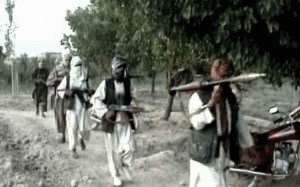The beleaguered Afghan government has offered a ceasefire to the Taliban, after the latter kidnapped about 200 bus passengers on 20th August in the Northern Province of Kunduz. The Taliban released all civilians but carried 20 Afghan security personnel away. The ceasefire offer, welcomed by the US and NATO forces, was rejected by Taliban commanders, who declared they would carry on their fight against Afghan forces assisted by foreign troops. The Afghan government claimed the Taliban released civilians because of operations launched by security forces, in which seven insurgents were killed.
The Afghan government had also offered peace talks in February 2018, agreed for “unconditional” negotiations and agreed to recognise Taliban as a legitimate political entity, but the Taliban declined to negotiate with the Afghan government and offered to talk with US forces.
The emboldened Taliban also fired 30 rockets, from two different locations, on the presidential palace when President Ashraf Ghani was delivering his Eid-al-Adha message. Although Afghan military helicopters destroyed both locations, killed four terrorists and arrested five insurgents, this indicates that terrorists are also tightening their hold on Kabul.
The Taliban have increased attacks, bringing more territory under their control and, in recent weeks, have attacked cities like Ghazni, killing many security forces personnel and civilians.
Recent successes have made Taliban commanders overconfident. Analysts claim that although Taliban are winning now, they have several inherent weaknesses whereby they cannot completely defeat Afghan forces.
Taliban implement a primitive and extreme form of Islam, which most Afghans do not wish to follow. Afghans want to use new technology, music, and favour giving basic rights to females. Secondly, Taliban are ruthless and slaughtered large number of civilians and government officials, especially security forces personnel. They have resorted to daylight massacres, raids, surprise attacks and bomb blasts. Thousands of Afghans have been killed in suicide bomb blasts, while tens of thousands were crippled. The inhuman behaviour of Taliban is disliked by common Afghans.
Thirdly, there is widespread corruption within Taliban groups. Several are involved in drug cultivation and smuggling. Afghan youths have become drug addicts because of increased drugs trade. Fourthly, the top Taliban leadership is predominantly Pashtun, hence other ethnic groups, like the Tajiks, Uzbeks and Hazara are reluctant to support them. Finally, Taliban are fully dependent on Pakistan and its Inter Services Intelligence (ISI) agency for training, finance, intelligence, weapons, communications equipment, shelter for their families and safe haven to them after operations or when Afghan security forces encounter them.
The Afghans hate Pakistan and claim that Islamabad is responsible for the turmoil in the country. In 2016, Gallup and Broadcasting Board of Governors conducted an opinion poll in which only 3.7 percent Afghans favoured Pakistan while 62 percent backed India.
US-led NATO (North Atlantic Treaty Organization) forces are in Afghanistan and President Trump has not announced any date for withdrawing the troops, and it is likely that their numbers may increase. Ranged against NATO troops, the Taliban may win battles but cannot win the war.
Approximately 350,000 soldiers of Afghan National Security Forces (ANSF) are responsible for maintaining law and order and countering the Taliban in war-torn Afghanistan. NATO forces often provide air support to ANSF to counter Taliban onslaughts.
However, ANSF is unable to effectively counter the Taliban and faces problems including rampant corruption, large-scale desertions, with several ANSF personnel joining Taliban along with weapons. ANSF morale is very low and, according to Afghanistan watchers, the ANSF has to replace people because of causalities and desertions. The ANSF also lacks motivation to fight the Taliban and is badly managed. The US has spent about $65 billion on ANSF, a large portion on training and equipment, but the force is still ill-trained and poorly equipped.
After being uprooted from Iraq and Syria, Islamic State of Iraq and Syria (ISIS) are trying hard to establish themselves in Afghanistan and Pakistan, as both countries are thoroughly radicalised. Hence, the ANSF has to counter ISIS and the Taliban.
Afghan watchers claim that Taliban and several other insurgent groups are getting assistance from the ISI. Numerous warnings and threats by the US, especially the Donald Trump administration, have not worked. Pakistan has not stopped assisting the Taliban and terrorist outfits like the Haqqani network. ISI will continue assisting terrorists till it succeeds in establishing a government of its choice in Kabul. The US should negotiate with countries like Russia, China, India and even Iran.
With its innate weaknesses, the Taliban will not be able to occupy Kabul, while the ANSF and US-led NATO troops must understand that, despite efforts for over 15 years, they could not defeat the Taliban. The only way to restore peace in Afghanistan is through negotiations. Washington should press Pakistan to compel the Taliban to negotiate and reach some solution. With Pakistan’s economy in the doldrums, potent pressure may work.
The Afghan government should also give some concessions to the Taliban that controls large parts of the country. While Taliban may demand enforcement of Islamic laws, withdrawal of foreign troops, etc, both parties must know that peace can be restored only through negotiations.





